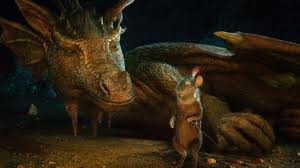He had turned into a dragon while he was asleep. Sleeping on a dragon’s hoard with greedy dragonish thoughts in his heart, he had become a dragon himself…he realized he was a monster cut off from the whole human race. An appalling loneliness came over him. He began to see the others had not really been fiends at all. He began to wonder if he himself had been such a nice person as he had always supposed.[1]
 Alas Eustace comes to himself. He sees the reflection and we are delighted with his providential journey to Aslan who alone removes those dragonish scales with his razor sharp claws:
Alas Eustace comes to himself. He sees the reflection and we are delighted with his providential journey to Aslan who alone removes those dragonish scales with his razor sharp claws:
The very first tear he made was so deep that I thought it had gone right into my heart. And when he began pulling the skin off, it hurt worse than anything I’ve ever felt…Then he caught hold of me – I didn’t like that much I was very tender underneath now that I had no skin on – and threw me in the water. It smarted like anything but only for a moment. After that it became perfectly delicious and as soon as I started swimming and splashing I found that all the pain had gone.[2]
Post-modernity is not only religious tradition unhinged from reason, but it is truth unhinged from the absolute, sex unhinged from the moral order, and language unhinged from meaning. How are dragons to lose their scales in such a world?
Hamlet’s conundrum is our own. The Greek undercurrents of Shakespeare’s masterpiece have meaning in the same way as does Prometheus and Narcissus in our modern epoch. The Greeks are bearing gifts if we clear the dullness of our understanding. Like the prodigal son, Hamlet is narrative poetry without a proper ending. He left Horatio to tell the story and Christ has left us.
Only through the imagination, that sees the need of bread to have nothing to do with physical hunger; that can see a boy as a dragon, or trees that talk; can we make the proper confessions. Like the unexamined life….the unconfessed life is a life less than what we would hope and an extremely dangerous undertaking.
The End.
[1] C.S. Lewis, The Voyage of the Dawn Treader
[2] C.S. Lewis, The Voyage of the Dawn Treader

